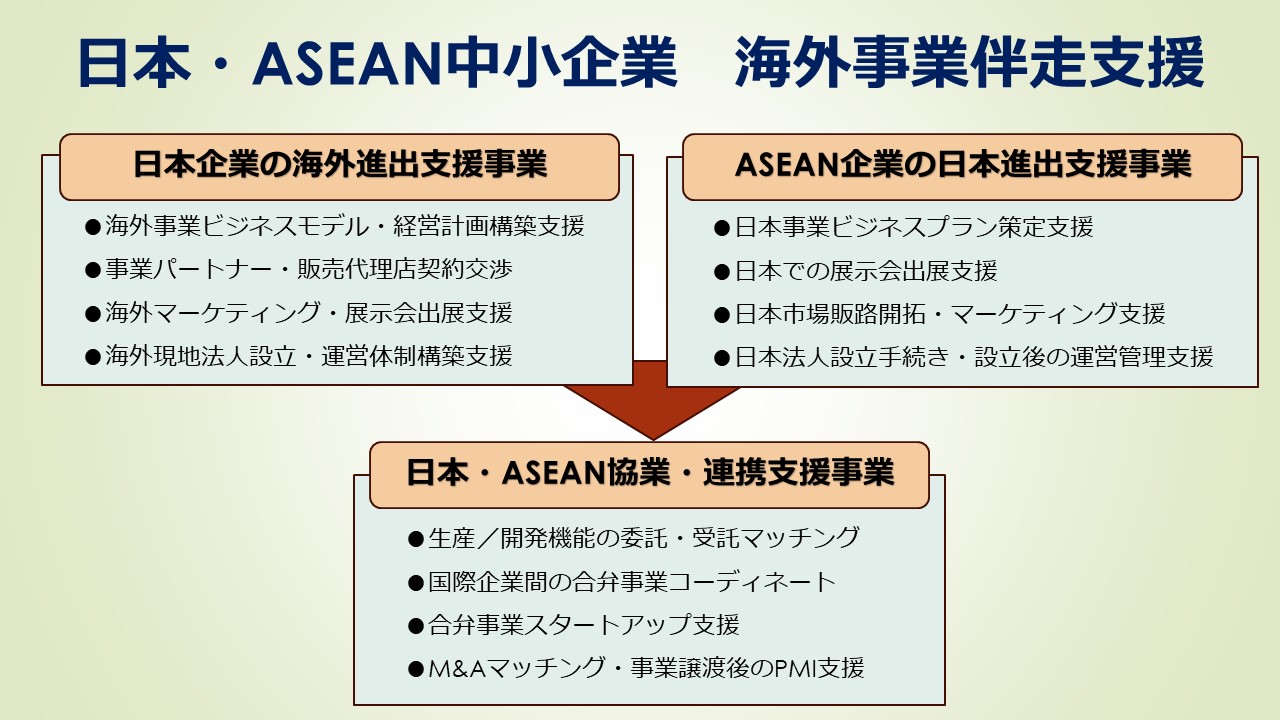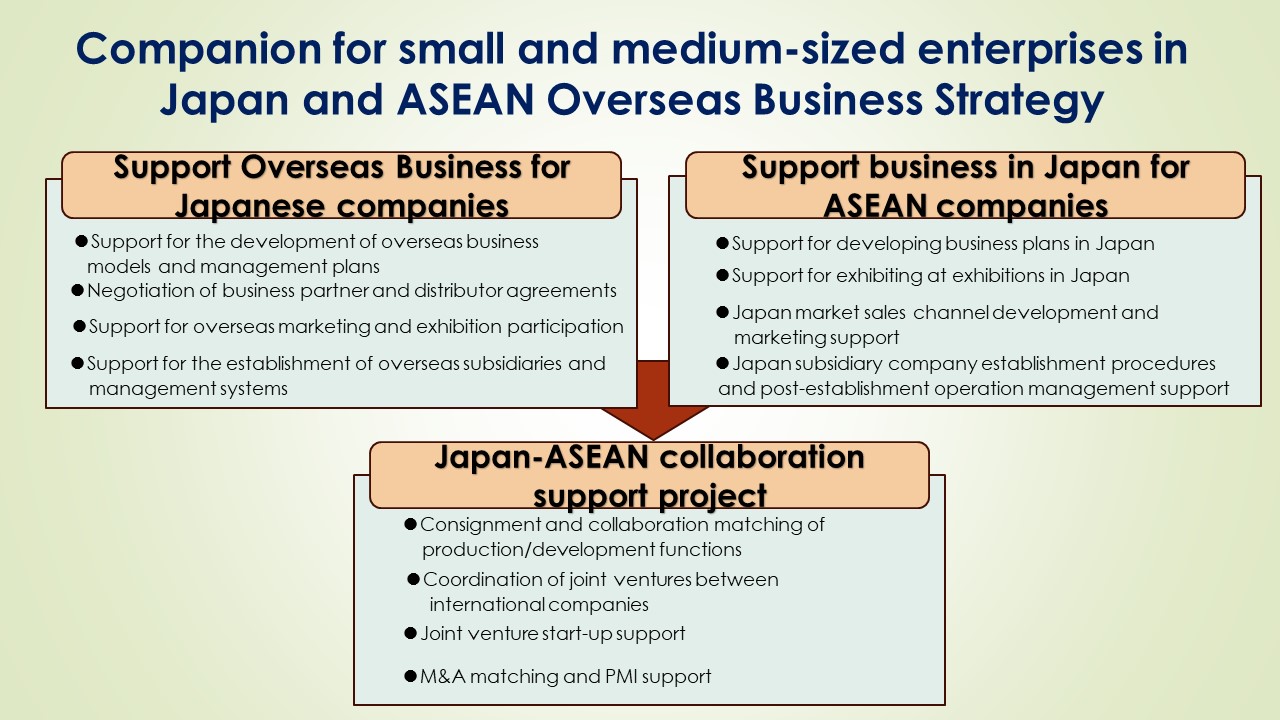日本企業の海外展開支援から双方向の経営資源コラボ支援へ

今まで10年にわたって続けてきました海外展開支援事業の方向性を大きく変化させたいと考えています。今まではどちらかというと日本企業の海外展開による成長発展を支援を基軸にしたものでした。とりわけベトナム事業に精通していたこともあり、日本企業のベトナム進出支援によるビジネス拡大への貢献が、ベトナムの経済成長にも直結するつながるという考えで進めてきました。
人材育成支援においても、日本企業のグローバル経営人材の育成や赴任前研修と並行して、ベトナムの経営人材育成を目的としたODAのプログラムでの研修講師として、「日本式経営のベトナムでの展開」を旗頭に、経営計画の策定と実践についてベトナム人経営者に向けに行ってきました。
しかし最早「日本式経営」をODAでベトナムを支援する意義は薄れてきたように感じます。日本の税金を使って研修を行うようなテーマとしては時代遅れの感が否めません。むしろ日本企業こそが海外から学ばなければならないことは山ほどあります。なぜ日本企業の競争力が過去20年以上にわたって下がり続けてきたのか、何か日本人全体が他人事のように受け止めてはいないでしょうか。そして悪いのは自分ではなく全て政府や政治家、経営者など他責とする世論がSNSの広がりとともに形成され、一億総無責任国家になってきているのではないかという危惧を感じるのです。
SDGsの取組みにおいても、日本は常に上から目線で、発展途上国の発展に貢献するんだという思い込みで偽善的になっているのではないでしょうか。
今後日本は少子化が加速し、一人ひとりの働きの生産性が上がらない限り、産業競争力が低下し、市場も縮小するということは、ほとんどの日本人は何となくわかっています。ただ問題は自分事ではないという意識の人が多数であることです。
今後、日本企業がさらに成長発展を遂げるには、まず自らの能力やノウハウは国際競争に負けているという認識をまず持つべきです。そのうえで、自らの強みを単に他国にODAで差し上げるのではなく、他国の強みをいかにして掛け合わせ、相乗効果で新たに革新的な付加価値を創造して競争優位性を確保できるかが重要となるでしょう。
日本から海外展開を図る目的が、日本企業が過去辿ってきた日本市場でのコスト競争力を高めるための手段に留まっている限り成長発展は望めません。日本製品をそのまま海外に輸出するだけでは競争に勝てません。製造、開発、販売、サービスそれぞれのバリューチェーンでの最適地オペレーション戦略に基づく海外展開であることが成功要因になってくるでしょう。今後はそのための海外展開支援に特化していきたいと思います。つまりベトナム展開ありきの海外展開支援ではありえなくなっているのです。
さらに、そのベトナムも単にローコストオペレーションを提供できる強みだけではなく、急速に商品開発力、グローバルな販路開拓、モノづくり生産性の向上が進んでいます。日本企業がそれらの強みを活用することも重要ですが、一方でベトナム企業に限らず多くのASEAN企業自身、日本市場を含む海外展開による事業拡大が着実に進みつつあります。ただ、まだ海外市場での販路開発も十分でなく、日本企業など外資と協業になる事業拡大ノウハウは十分ではありません。今後は外国企業の日本法人設立を含め、日本事業展開支援でのお役立ちで貢献していきたいと考えています。
日本企業の海外事業開発とベトナム等ASEAN企業の日本事業開発の架け橋になっていきたいとの思いが強くなっていますが、その先にはもっと深い連携や合弁等の協業展開、あるいはシナジーのさらなる発揮や事業承継や経営資源の相互補完を強めるために、日本と海外の中小企業間のM&Aのニーズも高まってくるでしょう。企業間の事業受託マッチングや企業統合も含めた広範な企業間再編による成長発展にも貢献していきたいと考えています。この3本柱が今後日本企業の生き残りのための処方箋であり、海外企業の成長発展の羅針盤となるのは間違いないところです。
3事業の詳細についてのプレゼン資料をまとめております。ご関心のおありの方はお問い合わせいただければと思います。初期無料相談で承っております。お問い合わせいただければ資料をダウンロードURLをお知らせします。

I’m considering making significant changes to the direction of the overseas expansion support business that we’ve been running for the past ten years. Up until now, it has primarily focused on supporting the growth and development of Japanese companies’ overseas expansion. Particularly, due to my familiarity with Vietnam’s business environment, I have been advancing the idea that supporting Japanese companies’ entry into Vietnam would contribute to both the expansion of their businesses and Vietnam’s economic growth.
In terms of talent development support, alongside training global management personnel for Japanese companies and pre-deployment training, I have also been conducting training programs funded by ODA (Official Development Assistance) aimed at developing management talent in Vietnam. As a trainer in these programs, I’ve been focusing on “Deploying Japanese-style Management in Vietnam,” providing Vietnamese business leaders with guidance on developing and implementing management plans.
However, I feel that the significance of supporting Vietnam with “Japanese-style Management” through ODA has diminished. There’s a sense of obsolescence in using Japanese tax money for such training themes. Instead, Japanese companies themselves have much to learn from abroad. Have we as Japanese not been too complacent, treating the decline in Japanese competitiveness over the past twenty years as someone else’s problem? There’s a growing concern that public opinion, shaped by the spread of social media, tends to shift blame onto others like the government, politicians, and business leaders, leading to a culture of collective irresponsibility.
Even in the context of SDGs initiatives, Japan often appears hypocritical, assuming a patronizing stance towards contributing to the development of developing countries.
In the future, as Japan’s population decline accelerates and individual productivity fails to increase, most Japanese understand that industrial competitiveness will decline, and markets will shrink. However, the problem lies in the fact that many perceive these issues as someone else’s concern.
For Japanese companies to further grow and develop, they must first recognize that their capabilities and know-how are lagging behind in international competition. Then, rather than simply offering their strengths to other countries through ODA, it’s essential to leverage the strengths of other countries, combining them synergistically to create innovative added value and secure competitive advantages.
If Japan’s overseas expansion aims only to enhance cost competitiveness in the Japanese market, growth and development cannot be expected. Exporting Japanese products as they are won’t win in the competition. Success will depend on overseas expansion based on optimal operational strategies in each value chain – manufacturing, development, sales, and services. Going forward, I would like to specialize in supporting overseas expansion for this purpose. In other words, the approach of supporting overseas expansion with Vietnam as the starting point is no longer viable.
Furthermore, Vietnam, in addition to offering low-cost operations, is rapidly advancing in product development capability, global market development, and manufacturing productivity improvement. While it’s crucial for Japanese companies to leverage these strengths, many ASEAN companies, not limited to Vietnamese ones, are steadily expanding their businesses overseas, including in the Japanese market. However, there’s still insufficient development in overseas market penetration, and knowledge about business expansion through collaboration with foreign companies, including Japanese ones, is lacking. In the future, I hope to contribute by providing support for Japanese business expansion, including establishing foreign subsidiaries, in addition to Japanese market expansion support.
While I’m increasingly motivated to serve as a bridge between Japanese companies’ overseas business development and ASEAN companies’ Japanese business development, deeper cooperation, joint ventures, or further synergy and business succession to strengthen mutual complementarity of management resources may lead to increased demand for M&A between small and medium-sized enterprises in Japan and overseas. I also aim to contribute to growth and development through extensive corporate restructuring, including business matching and corporate integration. These three pillars are undoubtedly the prescription for the survival of Japanese companies and the compass for the growth and development of overseas companies in the future.
I have prepared a presentation material detailing these three businesses. If you’re interested, please feel free to contact us. We offer free initial consultations. Upon inquiry, I will provide the download URL for the materials.
ーーー
Tôi đang xem xét việc thay đổi đáng kể hướng đi của doanh nghiệp hỗ trợ mở rộng quốc tế mà chúng tôi đã triển khai trong suốt mười năm qua. Cho đến nay, chú trọng chủ yếu vào việc hỗ trợ sự phát triển và mở rộng của các doanh nghiệp Nhật Bản ra nước ngoài. Đặc biệt, do sự quen thuộc của tôi với môi trường kinh doanh tại Việt Nam, tôi đã tiến hành ý tưởng rằng việc hỗ trợ các doanh nghiệp Nhật Bản mở cửa vào Việt Nam sẽ đóng góp vào cả sự mở rộng kinh doanh của họ và sự phát triển kinh tế của Việt Nam.
Trong việc hỗ trợ phát triển nhân lực, song song với việc đào tạo nhân sự quản lý toàn cầu cho các doanh nghiệp Nhật Bản và đào tạo trước khi đi công tác, tôi cũng đã tiến hành các chương trình đào tạo do ODA (Hỗ trợ Phát triển Chính Thức) tài trợ nhằm phát triển tài năng quản lý tại Việt Nam. Là một người đào tạo trong các chương trình này, tôi đã tập trung vào “Triển khai Quản lý kiểu Nhật tại Việt Nam”, cung cấp hướng dẫn cho các nhà lãnh đạo kinh doanh Việt Nam về việc phát triển và thực hiện kế hoạch quản lý.
Tuy nhiên, tôi cảm thấy ý nghĩa của việc hỗ trợ Việt Nam với “Quản lý kiểu Nhật” thông qua ODA đã giảm đi. Có một cảm giác lạc hậu khi sử dụng tiền thuế của Nhật Bản cho các chủ đề đào tạo như vậy. Thay vào đó, các doanh nghiệp Nhật Bản chính mình có rất nhiều điều cần học hỏi từ nước ngoài. Liệu chúng ta, những người Nhật, có quá tự mãn, coi sự suy giảm về mặt cạnh tranh của Nhật Bản trong suốt hơn hai mươi năm qua là vấn đề của người khác không? Có một lo ngại ngày càng tăng rằng ý kiến công cộng, được hình thành bởi sự lan rộng của truyền thông xã hội, thường chuyển trách nhiệm cho người khác như chính phủ, các nhà chính trị và doanh nhân, dẫn đến một văn hóa không chịu trách nhiệm chung.
Ngay cả trong ngữ cảnh các hoạt động SDG, Nhật Bản thường xuất hiện như một người dùng đạo đức giả, giả định một thái độ từ trên xuống để đóng góp vào sự phát triển của các nước đang phát triển.
Trong tương lai, khi suy thoái dân số của Nhật Bản gia tăng và năng suất cá nhân không tăng, hầu hết người Nhật hiểu rằng sự cạnh tranh công nghiệp sẽ suy giảm và thị trường sẽ co lại. Tuy nhiên, vấn đề nằm ở chỗ nhiều người coi đây là vấn đề của người khác.
Để các doanh nghiệp Nhật Bản có thể phát triển và mở rộng hơn nữa, họ phải nhận ra rằng khả năng và kiến thức của họ đang tụt lại trong cuộc cạnh tranh quốc tế. Sau đó, thay vì đơn giản là cung cấp các ưu điểm của mình cho các quốc gia khác thông qua ODA, việc tận dụng các ưu điểm của các quốc gia khác và kết hợp chúng một cách hợp tác để tạo ra giá trị gia tăng sáng tạo và đảm bảo lợi thế cạnh tranh là rất quan trọng.
Nếu mục tiêu của việc mở rộng ra nước ngoài của Nhật Bản chỉ là để nâng cao khả năng cạnh tranh chi phí trên thị trường Nhật Bản, thì không thể mong đợi sự phát triển. Xuất khẩu sản phẩm của Nhật Bản như chúng vẫn là không đủ. Sự thành công sẽ phụ thuộc vào việc mở rộng ra nước ngoài dựa trên các chiến lược hoạt động tối ưu trong mỗi chuỗi giá trị – sản xuất, phát triển, bán hàng và dịch vụ. Trong tương lai, tôi muốn chuyên môn hóa hỗ trợ mở rộng ra nước ngoài cho mục đích này. Nói cách khác, cách tiếp cận hỗ trợ mở rộng ra nước ngoài với Việt Nam là điểm xuất phát không còn khả thi nữa.





